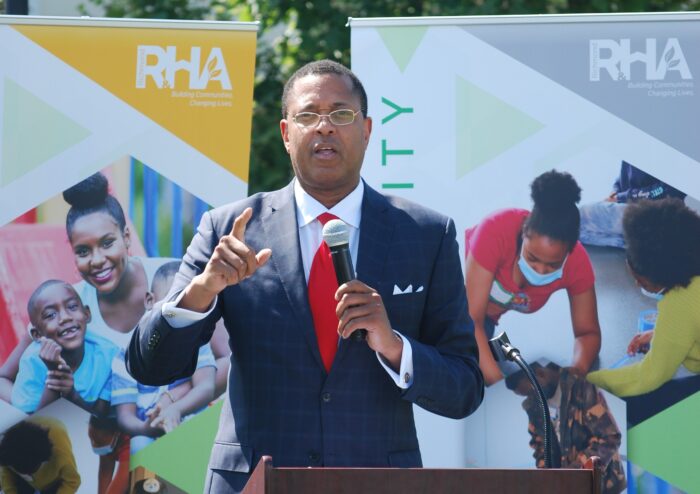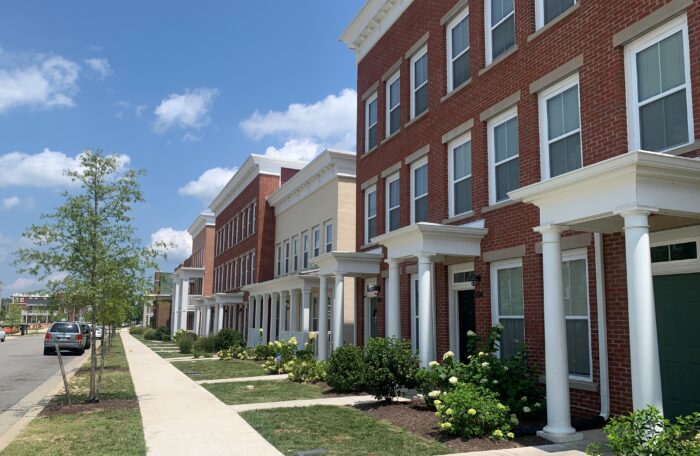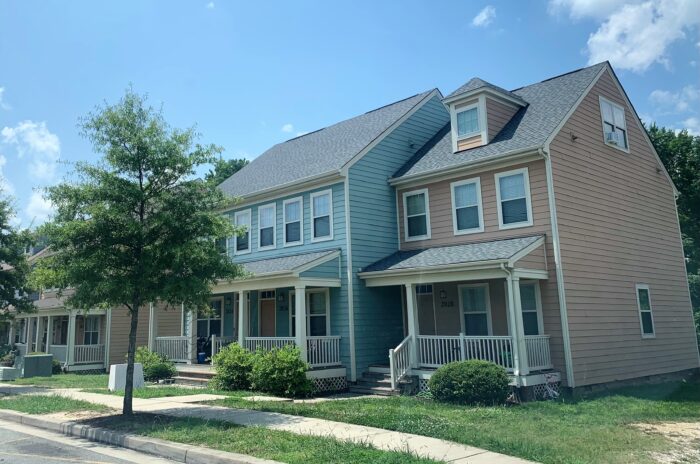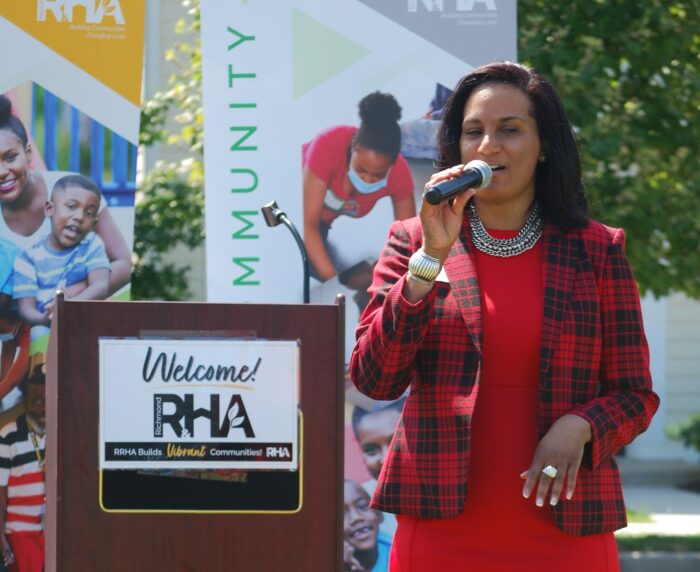
RRHA CEO Steven Nesmith announcing the new homeownership program last month. (Charlotte Matherly photos)
The city’s public housing authority is building a new program designed to cycle more people through public housing and into homeownership.
Ramping up to a fourth-quarter launch, the initiative aims to help public housing residents buy their own homes by reconfiguring mortgage loan requirements, providing down payment assistance grants and educating current public housing residents about homeownership.
Steven Nesmith, CEO at the Richmond Redevelopment & Housing Authority, or RRHA, said the program is the first of its kind nationwide.
Nesmith presented the homeownership program to City Council last month on the heels of Mayor Levar Stoney and other city leaders declaring a housing crisis in Richmond this spring.
Nesmith said in a recent interview with BizSense that Richmond has some of the oldest public housing units on the East Coast, and he wants this program to create hope for residents of those communities.
“Public housing was never intended for folks to live in it generation after generation and generation. … You have people with that mindset, and in part they have that mindset because there’s no hope,” Nesmith said. “Public housing was always intended to be transitional housing. … Ultimately, from a policy perspective and a moral perspective, we should be trying to help public housing residents get to a place of self-sufficiency.”
Nesmith said that’s exactly what he intends his plan to do.
How it works

The Armstrong Renaissance development in Richmond’s East End is one of the areas where new homes will be built for the RRHA program.
The housing authority has struck agreements and is in conversations with several lenders and organizations – including Bank of America, Truist bank, Virginia Credit Union and nonprofit and government agencies – to provide down payment assistance grants for the program.
Also among the funding group is Peoples Advantage Federal Credit Union, which recently received a $7 million federal subsidy that Nesmith said will help Richmond public housing residents.
The selling point on these grants, Nesmith said, is that homeowners will never have to pay them back.
Nesmith said the commonwealth’s housing and community development department is also on board, as are other city, state and federal institutions that’ll help provide down payment assistance.
RRHA spokeswoman Angela Fountain said the authority is still working with partners to finalize the initiative and determine how much funding each organization will front for the program.
Nesmith, a former mortgage insurance executive, said the initiative is designed to layer resources from several different institutions to help potential homeowners make a larger first installment and cut down on their mortgage payments.
“When you begin to … do that layering effect, you get down to what would be affordable housing,” Nesmith said.
To help build the homes for the program, the Richmond Development Corporation, a nonprofit subsidiary of the RRHA, is partnering with an unidentified private investor Nesmith said will bring between $50 million and $100 million to the table for new affordable housing developments. Under the RRHA’s development agreements, developers must market units to public housing residents first. RRHA also is considering developing its own properties for this program through RDC.
Nesmith said RRHA does not own but is developing units for homeownership in three areas. Fountain said the rental properties section is complete at Armstrong Renaissance, the RRHA is working on closing a deal to begin development in Blackwell, and infrastructure is being worked on at Highland Grove.
It’s still to be determined exactly how many housing units will be built through the program and Fountain said prices and interest rates on units have not been determined and will vary based on a multitude of factors.
The other arm of the initiative — a mandatory homeownership education program — partners with such local and state nonprofits as Housing Opportunities Made Equal of Virginia and the Southside Community Development and Housing Corporation, also led by the RRHA.
Qualified public housing residents will undergo an extensive credit counseling program before buying a home. Fountain gave a conservative estimate that the counseling could take about six months but will vary in each circumstance. Then, after purchasing a home, buyers will receive continued budgeting and finance education.
Nesmith said this is designed so that RRHA is not only helping people move out of public housing but ensuring that these new homeowners can build long-term wealth and break an often-generational cycle of living in public housing.
“[It’s] to ensure that the new homeowner … does not default on their monthly mortgage payments or, ultimately, does not get foreclosed on,” Nesmith said. “We want them to stay in that house for years to come, and so that’s where you get the wealth-building portion of it.”
As more public housing residents buy homes through this program, Nesmith said, it’ll create room for others to get into public housing, work their way through the program and so on. He estimates it’ll take a year or two to really start making a dent and cycling people through public housing.
Fountain said the authority wouldn’t be able to estimate how many public housing residents will be placed in new homes until the program is fully up and running.
Who qualifies?

Highland Grove in Northside is another area where housing units for the program are expected to pop up.
While any one of Richmond’s 10,000 families in public housing is eligible for the program, certain qualifications must be met to be considered “mortgage-ready,” Nesmith said.
RRHA has not yet begun the mortgage underwriting process to determine who will qualify for homeownership.
However, applicants must have two years of consistent work experience, meet an income threshold, be a first-time homebuyer and have a two-year history of on-time monthly rental payments, among other qualifications.
Nesmith said one of the program’s major benefits is that at partner lending institutions, those on-time rent payments and not credit score will be the main consideration for mortgage loans.
“The underwriting to qualify for a mortgage will not be based on your credit score at all. Rather, the predominant criteria that’s going to be used is whether or not the public housing resident has a history … of consistent rental payment,” Nesmith said. “Those elements are just game changers.”
What’s next?
Nesmith said the idea was sparked when Marcia Fudge, the U.S. secretary of housing and urban development, sent out guidance last year asking lending and banking institutions to consider public housing residents’ ability to make rent on time rather than credit score.
“I took it a step further,” Nesmith said. “I said, in negotiating with all these partners, ‘Let’s not (just) consider (rent payments). Let’s make sure it’s the predominant criteria for which a public housing resident might qualify.’ And everyone’s on board.”
RRHA has been in negotiations with partner organizations for about five months. Nesmith said it took a good bit of convincing and making the case for his initiative from a business standpoint.
Now, preparing to launch in the last quarter of 2023, Nesmith said RRHA will be determining how many of its current public housing residents are mortgage-ready and looking toward onboarding people into the program.
RRHA is also in talks with Stoney, who in his State of the City address earlier this year said he set aside $2 million in the city budget for affordable housing. Fountain said RRHA is exploring how that funding can be used for its program, such as whether it helps cover closing costs or other expenses.
After RRHA announced the program last month, Nesmith briefed the City Council. Support from council members appeared unanimous, with several voicing their support at a meeting soon after.
“This is great,” said Reva Trammell, the council member who represents the Southside. “I just know that there’s a lot of people that want to get out of public housing and be able to say, ‘This is mine. I have worked so hard, and now I got something that I can call my own with my family.’”

RRHA CEO Steven Nesmith announcing the new homeownership program last month. (Charlotte Matherly photos)
The city’s public housing authority is building a new program designed to cycle more people through public housing and into homeownership.
Ramping up to a fourth-quarter launch, the initiative aims to help public housing residents buy their own homes by reconfiguring mortgage loan requirements, providing down payment assistance grants and educating current public housing residents about homeownership.
Steven Nesmith, CEO at the Richmond Redevelopment & Housing Authority, or RRHA, said the program is the first of its kind nationwide.
Nesmith presented the homeownership program to City Council last month on the heels of Mayor Levar Stoney and other city leaders declaring a housing crisis in Richmond this spring.
Nesmith said in a recent interview with BizSense that Richmond has some of the oldest public housing units on the East Coast, and he wants this program to create hope for residents of those communities.
“Public housing was never intended for folks to live in it generation after generation and generation. … You have people with that mindset, and in part they have that mindset because there’s no hope,” Nesmith said. “Public housing was always intended to be transitional housing. … Ultimately, from a policy perspective and a moral perspective, we should be trying to help public housing residents get to a place of self-sufficiency.”
Nesmith said that’s exactly what he intends his plan to do.
How it works

The Armstrong Renaissance development in Richmond’s East End is one of the areas where new homes will be built for the RRHA program.
The housing authority has struck agreements and is in conversations with several lenders and organizations – including Bank of America, Truist bank, Virginia Credit Union and nonprofit and government agencies – to provide down payment assistance grants for the program.
Also among the funding group is Peoples Advantage Federal Credit Union, which recently received a $7 million federal subsidy that Nesmith said will help Richmond public housing residents.
The selling point on these grants, Nesmith said, is that homeowners will never have to pay them back.
Nesmith said the commonwealth’s housing and community development department is also on board, as are other city, state and federal institutions that’ll help provide down payment assistance.
RRHA spokeswoman Angela Fountain said the authority is still working with partners to finalize the initiative and determine how much funding each organization will front for the program.
Nesmith, a former mortgage insurance executive, said the initiative is designed to layer resources from several different institutions to help potential homeowners make a larger first installment and cut down on their mortgage payments.
“When you begin to … do that layering effect, you get down to what would be affordable housing,” Nesmith said.
To help build the homes for the program, the Richmond Development Corporation, a nonprofit subsidiary of the RRHA, is partnering with an unidentified private investor Nesmith said will bring between $50 million and $100 million to the table for new affordable housing developments. Under the RRHA’s development agreements, developers must market units to public housing residents first. RRHA also is considering developing its own properties for this program through RDC.
Nesmith said RRHA does not own but is developing units for homeownership in three areas. Fountain said the rental properties section is complete at Armstrong Renaissance, the RRHA is working on closing a deal to begin development in Blackwell, and infrastructure is being worked on at Highland Grove.
It’s still to be determined exactly how many housing units will be built through the program and Fountain said prices and interest rates on units have not been determined and will vary based on a multitude of factors.
The other arm of the initiative — a mandatory homeownership education program — partners with such local and state nonprofits as Housing Opportunities Made Equal of Virginia and the Southside Community Development and Housing Corporation, also led by the RRHA.
Qualified public housing residents will undergo an extensive credit counseling program before buying a home. Fountain gave a conservative estimate that the counseling could take about six months but will vary in each circumstance. Then, after purchasing a home, buyers will receive continued budgeting and finance education.
Nesmith said this is designed so that RRHA is not only helping people move out of public housing but ensuring that these new homeowners can build long-term wealth and break an often-generational cycle of living in public housing.
“[It’s] to ensure that the new homeowner … does not default on their monthly mortgage payments or, ultimately, does not get foreclosed on,” Nesmith said. “We want them to stay in that house for years to come, and so that’s where you get the wealth-building portion of it.”
As more public housing residents buy homes through this program, Nesmith said, it’ll create room for others to get into public housing, work their way through the program and so on. He estimates it’ll take a year or two to really start making a dent and cycling people through public housing.
Fountain said the authority wouldn’t be able to estimate how many public housing residents will be placed in new homes until the program is fully up and running.
Who qualifies?

Highland Grove in Northside is another area where housing units for the program are expected to pop up.
While any one of Richmond’s 10,000 families in public housing is eligible for the program, certain qualifications must be met to be considered “mortgage-ready,” Nesmith said.
RRHA has not yet begun the mortgage underwriting process to determine who will qualify for homeownership.
However, applicants must have two years of consistent work experience, meet an income threshold, be a first-time homebuyer and have a two-year history of on-time monthly rental payments, among other qualifications.
Nesmith said one of the program’s major benefits is that at partner lending institutions, those on-time rent payments and not credit score will be the main consideration for mortgage loans.
“The underwriting to qualify for a mortgage will not be based on your credit score at all. Rather, the predominant criteria that’s going to be used is whether or not the public housing resident has a history … of consistent rental payment,” Nesmith said. “Those elements are just game changers.”
What’s next?
Nesmith said the idea was sparked when Marcia Fudge, the U.S. secretary of housing and urban development, sent out guidance last year asking lending and banking institutions to consider public housing residents’ ability to make rent on time rather than credit score.
“I took it a step further,” Nesmith said. “I said, in negotiating with all these partners, ‘Let’s not (just) consider (rent payments). Let’s make sure it’s the predominant criteria for which a public housing resident might qualify.’ And everyone’s on board.”
RRHA has been in negotiations with partner organizations for about five months. Nesmith said it took a good bit of convincing and making the case for his initiative from a business standpoint.
Now, preparing to launch in the last quarter of 2023, Nesmith said RRHA will be determining how many of its current public housing residents are mortgage-ready and looking toward onboarding people into the program.
RRHA is also in talks with Stoney, who in his State of the City address earlier this year said he set aside $2 million in the city budget for affordable housing. Fountain said RRHA is exploring how that funding can be used for its program, such as whether it helps cover closing costs or other expenses.
After RRHA announced the program last month, Nesmith briefed the City Council. Support from council members appeared unanimous, with several voicing their support at a meeting soon after.
“This is great,” said Reva Trammell, the council member who represents the Southside. “I just know that there’s a lot of people that want to get out of public housing and be able to say, ‘This is mine. I have worked so hard, and now I got something that I can call my own with my family.’”




This sound promising, I am curious to know what are the income requirements. If public housing residents aren’t making a decent wages how can they afford to buy?
Exactly!! RRHA had a program similar to this in the 1990s and early 2000s and it helped a couple of hundred residents when agencies like Better Housing, Southside Housing Development Corp, and other city funded CDCs built new homes in the $120-150k. Many RRHA residents fall under the 30% of LMI for the metro area meaning their income for a family of 4 is below $32,000. The program also requires no past due rent issues but those number are higher in RRHA communities as well. Even given all the DP assistance families in those income levels unfortunately can not afford… Read more »
I really blame a lot of these low paying jobs that force people to be border line homeless and how there are very little good paying jobs. Along with how every thing works to limit the supply of housing.
In the meantime the delapidated mobile home park housing crisis in Richmond continues. In total, there are an estimated 1,000 mobile homes in the city’s seven mobile parks. The organization contracted by the city to make repairs will be able to help only a small percentage of the hundreds of homes in desperate need of repair. And because of strict eligibility requirements, that will further limit those that are most vulnerable – mobile homes built before 1976 will not be eligible for the program. With a large percentage of homes 47 years or older, those who need the most help will… Read more »
The city of Richmond going wild upzoning all the abondoned parking lots into 12 story buildings is one of the best things they have done to raise housing supply. Also Richmond pound for pound is adding more housing then LA or San Fransisco.
The emphasis remains in keeping the working poor in specific neighborhoods which will breed youth gangs. Public housing looks better than it did but is stuck in a rut. The City can do so much more by utilizing its real estate tax as an incentive for developers to spread the housing opportunities to a wider area, including the surrounding counties if they’d participate.
When I studied urban planning the worst thing you can do is put poor people in very small neighborhoods and keep them from moving up. I remember in the 1990’s when I drove though Chicago and saw them knocking down their public housing projects.